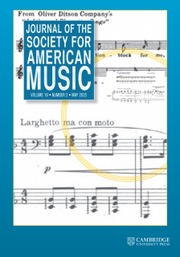No CrossRef data available.
Article contents
“The World is His Song”: Paul Robeson's 1958 Carnegie Hall Concerts and the Cosmopolitan Imagination
Published online by Cambridge University Press: 16 May 2013
Abstract
Paul Robeson's celebrated comeback recitals at Carnegie Hall in 1958 marked the singer's return to the world's concert stages after his ban for much of the 1950s. The recitals, this article argues, can be understood as a presentation of cosmopolitan thinking and action, of a certain way of being in and interacting with the world, and also a mid-century critique of American nationalist politics. As such, the article is an elaboration of scholarship that has considered aspects of internationalism in Robeson's discourse and (musical) practice. Drawing on the insights of the new or critical cosmopolitanism, a diverse and loose body of theory that has gained currency since the 1990s, the essay thinks through Robeson's Carnegie Hall events in terms of the practices of the concert hall recital, specifically programming, suggesting what it might mean to be a cosmopolitan singer in a specific historical moment.
- Type
- Research Article
- Information
- Copyright
- Copyright © The Society for American Music 2013


